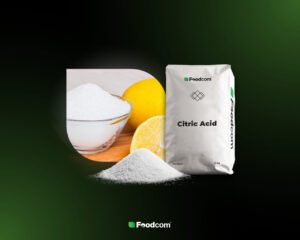- Technical gelatin – stable prices and growing interest in the chemical, packaging, and biodegradable materials sectors.
- Calcium Hypochlorite – high seasonal demand and limited availability of raw materials, putting upward pressure on prices.
- Citric acid (monohydrate and anhydrous) – high demand, but sharp price declines due to increased supply from China.
- Trisodium citrate – oversupply of raw materials is leading to price reductions, which is helping to improve production margins and increase interest in long-term contracts.
Spring 2025 will bring dynamic changes – from the fall in citric acid prices to the rise in oil market tensions. Find out which commodities have gained in value, where price bargains are emerging and what global trends are shaping purchasing decisions.
Read the latest analysis and prepare for change before your competitors do!
Technical gelatine
Technical gelatine is a raw material widely used in industry, especially in the production of adhesives, where it acts as a natural binder with good binding and elastising properties. Currently, its price is relatively low, making it an attractive raw material for the chemical and packaging industries. Thanks to its high availability and functionality, technical gelatine is increasingly becoming the solution of choice in technical applications where value for money is key. Its use is also growing in the context of more sustainable and biodegradable materials.
Calcium Hypochlorite
Calcium Hypochlorite, also known as chlorinated lime, is a powerful disinfectant mainly used for the treatment of swimming pool water and the disinfection of drinking water and industrial surfaces. There is currently a high demand for this product in the market, mainly due to the seasonal needs of the swimming pool and sanitation sector. At the same time, there is limited availability of raw material, which, combined with high demand, may lead to further price increases. The product is valued for its stability and high content of available chlorine, making it one of the most effective disinfectants in its class.
Citric acid
Citric acid, in both monohydrate and anhydrous forms, is a key ingredient in beverage and food production, where it acts as an acidity regulator, preservative and flavouring agent. There is a consistently high demand for this product on the market, especially from functional and soft drink manufacturers. Despite this, citric acid prices have fallen significantly, mainly due to increased supply from China, which dominates global citric acid production. For many producers, this is a signal to increase purchases and build stocks at favourable prices.
Trisodium citrate
Trisodium Citrate, or trisodium citrate, is a compound used extensively in the food industry, mainly as an acidity regulator, emulsifier and stabiliser in beverages and dairy products. Like citric acid, its consumption is increasing in parallel with the growth in consumption of processed foods and ready-made beverages. Recently, we have seen a significant reduction in the price of this raw material on international markets, due to oversupply resulting from intensive exports from China. For the food industry, this is a favourable situation that can improve production margins and encourage larger long-term contracts.
NEWS
In mid-April 2025, oil prices rebounded after earlier significant declines – the deepest in four years. Signs of a temporary easing of trade tensions between the US and China are credited as the upward impetus, which boosted investor optimism somewhat. In addition, the market has been influenced by new US sanctions on an Iranian oil transport operator, which may limit supply from Iran. Although prices have temporarily increased, the situation remains volatile and the market is still heavily influenced by further geopolitical and trade developments.
In April 2025, the European methanol market is facing a drop in prices, particularly evident in France, Germany and the Netherlands. The main reason for this is oversupply – supplies from the US, Trinidad and Middle Eastern countries are constantly arriving in Europe and local storage facilities are already full. At the same time, demand from downstream industries such as formaldehyde and MTBE production remains noticeably weakened. The situation is also exacerbated by falling global energy commodity prices, which reduces the competitiveness of exports. All indications are that price pressures will continue for some time to come.
US-based Aemetis, through its Indian company Universal Biofuels, has secured biodiesel orders worth a total of $31 million from three state-owned fuel distributors in India. These contracts are part of India’s broader strategy to increase the share of biofuels in the country’s energy mix, supporting its goals of reducing greenhouse gas emissions and improving air quality. Aemetis plans to expand its offerings in the future to include sustainable aviation fuel (SAF) and renewable diesel, in line with the growing demand for green energy sources in the region.

![What’s new in the chemical industry? Market overview and analysis [April 2025] What’s new in the chemical industry? Market overview and analysis [April 2025]](https://foodcom.pl/wp-content/uploads/2025/04/Global-Report-szablon-pod-bloga24-1-1520x760.png)


![What’s new in the food industry? Market overview and analysis [April 2025] What’s new in the food industry? Market overview and analysis [April 2025]](https://foodcom.pl/wp-content/uploads/2025/04/biuletyn-food-600x300.png)
![What’s new in the chemical industry? Market overview and analysis [March 2025] What’s new in the chemical industry? Market overview and analysis [March 2025]](https://foodcom.pl/wp-content/uploads/2025/03/industrialny-szablon-600x300.png)
![What’s new in the chemical industry? Market overview and analysis [January 2025] What’s new in the chemical industry? Market overview and analysis [January 2025]](https://foodcom.pl/wp-content/uploads/2025/01/Biuletyn-na-bloga-600x300.png)

